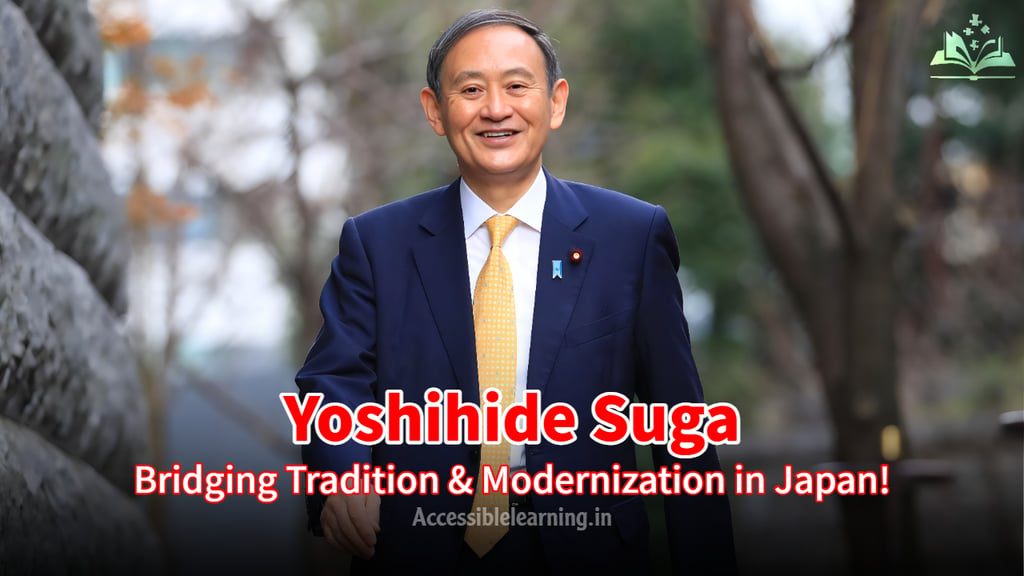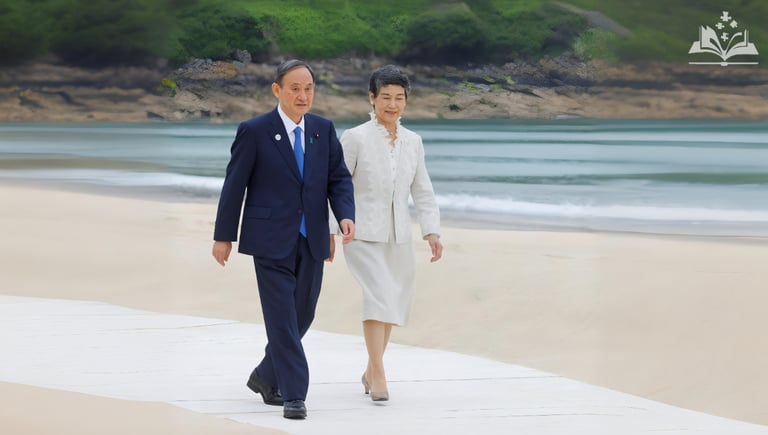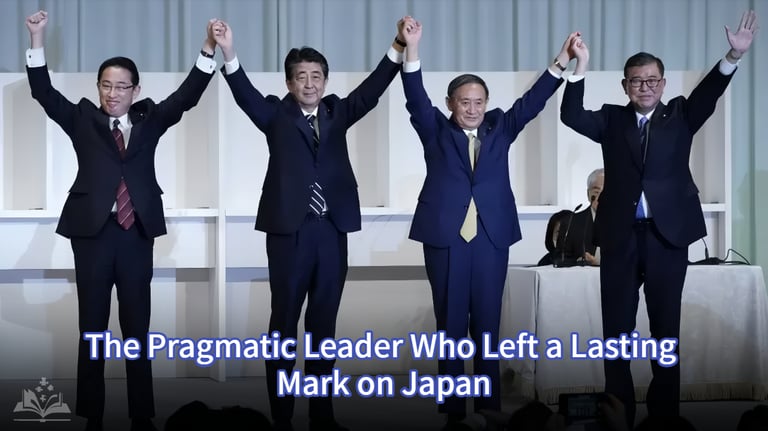
Yoshihide Suga: The Pragmatic Leader Who Left a Lasting Mark on Japan!
Discover the inspiring journey and impactful leadership of Yoshihide Suga, Japan’s pragmatic leader who championed digital transformation, rural revitalization, and geopolitical stability. Explore his legacy and contributions to modern Japanese politics.
BIOGRAPHYTHE GREAT LEADERPOLITICAL JOURNEYJAPAN
Kim Shin
12/28/20247 min read


Yoshihide Suga (菅義偉), Japan's 99th Prime Minister, is a compelling figure in modern Japanese politics. From humble beginnings as a farmer’s son to ascending the highest office in one of the world’s largest economies, Suga’s life exemplifies determination, perseverance, and an unwavering commitment to governance. Despite his brief tenure as Prime Minister, Suga's legacy lies in his pragmatic leadership and focus on administrative efficiency.
Early Life and Humble Beginnings
Yoshihide Suga was born on December 6, 1948, in the small rural village of Ogachi, Akita Prefecture. His father, Wasaburo Suga, was a strawberry farmer who worked tirelessly to support his family, while his mother, Tatsu Suga, was a schoolteacher. Growing up in a farming household, Suga developed a strong work ethic and a deep appreciation for rural Japan's challenges. His rural upbringing profoundly influenced his later efforts to revitalize Japan’s regional economies.
Suga was not an extraordinary student but displayed an innate sense of discipline and hard work. After finishing high school, he moved to Tokyo, initially working at a cardboard factory and other part-time jobs to fund his studies. He graduated from Hosei University in 1973 with a degree in law—a significant achievement given that he had no political or financial family background to lean on.
Entry into Politics
Suga’s political career began in 1975 when he became a secretary to Hikosaburo Okonogi (小此木彦三郎), a Diet member from Kanagawa Prefecture. This role gave him firsthand experience in Japanese politics and the daily grind of political maneuvering. Eager to forge his own path, Suga ran for and won a seat on the Yokohama City Council in 1987. During his tenure, he championed practical solutions to everyday problems, such as improving city infrastructure and reducing bureaucratic inefficiencies.
In 1996, Suga transitioned to national politics, winning a seat in the House of Representatives, representing Kanagawa’s 2nd District. Lacking political pedigree, Suga relied on grassroots campaigning and direct engagement with voters. He gained a reputation for being approachable and relentlessly focused on results, a contrast to many politicians who came from Japan’s elite political families.
Rise to Prominence in National Politics!
Suga steadily rose through the ranks of the Liberal Democratic Party (LDP). Known as a political operator who avoided factionalism, he focused on policy over ideology, which made him a key ally of then-Prime Minister Shinzo Abe. As a pragmatic leader, Suga concentrated on reforms that simplified administrative processes, supported small businesses, and empowered local governments.
His appointment as Chief Cabinet Secretary in 2012 marked a turning point in his career. Often referred to as the “right-hand man” of Abe, Suga played a pivotal role in shaping and communicating government policy. He was the face of the administration during major crises, such as natural disasters, the North Korean missile threat, and the COVID-19 pandemic’s initial phases.
Roots in Rural Japan and Influences!
Yoshihide Suga’s early life in Ogachi, a snow-laden region of Akita Prefecture, is integral to understanding his grounded personality. His upbringing in a farming family instilled a deep appreciation for rural challenges, which would later define his political priorities, including regional revitalization and infrastructure development.
The contrast between urban Tokyo and his rural hometown made him an advocate for policies aimed at bridging the economic and developmental disparities between Japan’s urban centers and its countryside. His modest beginnings and the grit required to move to Tokyo for education without financial or political backing highlight his resilience and independence.


Prime Ministership
When Shinzo Abe resigned in September 2020 due to health issues, Suga emerged as the frontrunner to succeed him. Backed by key LDP factions, he was elected party leader and subsequently became Japan’s Prime Minister on September 16, 2020. His rise to the top symbolized merit-based success in a political system often dominated by hereditary politicians.
Policy Priorities and Achievements
Pandemic Management: Suga’s tenure was defined by the COVID-19 pandemic. Although initially criticized for the slow vaccine rollout, he accelerated the process, achieving one of the world’s highest vaccination rates by the end of 2021. He also introduced economic stimulus measures to support struggling businesses and families.
Digital Transformation: A key policy initiative under Suga was the creation of Japan’s Digital Agency in 2021, tasked with modernizing the nation’s outdated bureaucratic systems. This reform aimed to enhance government efficiency and improve citizen access to digital services.
Environmental Goals: Suga made significant strides in climate policy by committing Japan to achieve carbon neutrality by 2050. This ambitious pledge marked a shift in Japan’s approach to renewable energy and environmental sustainability.
Economic Reforms: Suga emphasized deregulation and regional revitalization. He sought to boost Japan’s economy by encouraging tourism, foreign investments, and small business growth. Programs like the "Go To Travel" campaign aimed to support the domestic tourism sector amid the pandemic.
Foreign Relations: Suga prioritized Japan’s alliance with the United States while maintaining a cautious but pragmatic approach toward China. He actively engaged with Southeast Asian nations to counterbalance China's growing influence and strengthen Japan's position in the Asia-Pacific region.
Challenges During His Tenure!
Suga’s administration faced significant challenges, which ultimately contributed to his decision to step down. Public dissatisfaction with the government’s handling of the pandemic, particularly the decision to proceed with the Tokyo Olympics amid rising COVID-19 cases, led to declining approval ratings. Additionally, his reserved personality and lack of charisma made it difficult for him to connect with the public on a personal level.
In September 2021, Suga announced that he would not seek re-election as LDP leader, ending his tenure as Prime Minister after just one year in office. His successor, Fumio Kishida, took over in October 2021.
Personal Traits and Lifestyle
Yoshihide Suga is known for his simplicity, discipline, and work ethic. He begins his day at 5 a.m., often starting with physical exercises, including 100 sit-ups. He is famously frugal, preferring soba noodles for lunch and avoiding extravagance. Suga’s love for pancakes became a media sensation after he was spotted enjoying them during a break from his hectic schedule.
Despite being a public figure, Suga keeps his family life private. He is married and has three sons, but little is publicly known about his personal relationships, reflecting his preference for maintaining a low profile.


Career as Chief Cabinet Secretary (2012–2020)
Before his prime ministership, Suga’s role as Chief Cabinet Secretary under Shinzo Abe was instrumental in shaping his leadership profile. Often referred to as the "shadow prime minister," Suga served as Abe's primary advisor, strategist, and spokesperson.
Key Contributions in This Role!
Japan’s Security Strategy: Suga was deeply involved in Japan’s national security reforms, including the reinterpretation of Article 9 of the Japanese Constitution to allow for collective self-defense. This was a controversial move but one seen as necessary to bolster Japan’s role in regional security.
"Abenomics" Support: Suga was a critical enabler of "Abenomics," Abe’s economic strategy focusing on monetary easing, fiscal stimulus, and structural reforms. Suga worked on implementing policies that streamlined bureaucratic inefficiencies, supporting the broader economic agenda.
Tourism Boom: Suga played a pivotal role in promoting tourism as a growth strategy. His initiatives, such as relaxing visa requirements and promoting Japan’s cultural heritage, resulted in record-breaking numbers of international tourists before the pandemic.
Reiwa Era Announcement: Suga famously announced the name of Japan’s new imperial era, “Reiwa,” in 2019, earning him the nickname “Uncle Reiwa.” The announcement symbolized his role as a public figure who bridged tradition and modernization.
Foreign Policy: Navigating Complex Geopolitics!
During his tenure as both Chief Cabinet Secretary and Prime Minister, Suga was tasked with managing Japan’s position in an increasingly complex global landscape.
Key Focus Areas
Strengthening U.S.-Japan Alliance: Suga maintained a close relationship with the United States, emphasizing security cooperation. His first official visit as Prime Minister was to meet President Joe Biden, signaling the importance of the alliance in countering regional threats like North Korea and balancing China’s growing influence.
Engagement with Southeast Asia: Suga prioritized relations with ASEAN countries, focusing on economic partnerships and strategic cooperation. His visit to Vietnam and Indonesia highlighted Japan’s commitment to maintaining regional stability in the Indo-Pacific.
Relations with China: While Suga sought economic cooperation with China, he was firm on contentious issues, such as China’s activities in the South China Sea and its stance on Hong Kong and Taiwan. He advocated for a balanced approach to safeguard Japan’s interests.
Global Diplomacy: Suga continued Japan’s role in global leadership by participating in international efforts such as the G7 and G20, where he advocated for free trade, climate action, and economic recovery post-COVID-19.


Domestic Policies: Beyond the Pandemic!
While Suga’s leadership is often associated with the pandemic, his broader domestic policies reveal his focus on long-term structural reforms.
Digital Transformation
The creation of the Digital Agency under Suga’s leadership was a landmark achievement. Japan’s bureaucracy had long been criticized for inefficiency and reliance on outdated technologies. The agency’s establishment aimed to modernize public services, reduce paperwork, and promote digital literacy nationwide.
Rural Development
Suga’s deep connection to rural Japan drove policies aimed at regional revitalization. He sought to decentralize economic activities by encouraging businesses to expand operations outside urban hubs, thus addressing population decline and economic stagnation in rural areas.
Healthcare Reforms
While addressing the immediate challenges of COVID-19, Suga also emphasized improving Japan’s healthcare infrastructure to prepare for future pandemics. His administration allocated funds for hospital upgrades and research into infectious diseases.
Social Reforms
Suga initiated discussions on social issues, including labor market reforms to address Japan’s shrinking workforce and policies to support working mothers. Although these efforts were in their infancy, they reflected his awareness of Japan’s long-term demographic challenges.
Post-Premiership Contributions
Since stepping down as Prime Minister, Suga has remained an influential figure in Japanese politics. He continues to advocate for policies that focus on administrative reform, digital innovation, and regional development. His insights and experiences, particularly in navigating crises and advancing structural reforms, make him a valuable voice within the LDP.
Legacy and Lessons from His Leadership!
Yoshihide Suga’s tenure as Japan’s Prime Minister may have been brief, but it was marked by significant policy achievements and a leadership style rooted in practicality. His journey from a strawberry farm in rural Akita to the helm of Japanese politics embodies the values of hard work, resilience, and determination.
His contributions to modernizing Japan’s digital infrastructure, addressing climate change, and managing geopolitical complexities have left a lasting impact. Suga’s legacy lies not only in his policies but also in his story—a reminder that success in politics can be achieved through dedication, discipline, and a commitment to serving the public.
Even after leaving office, Suga remains a symbol of perseverance, inspiring a new generation of leaders to prioritize action over accolades.
Subscribe To Our Newsletter
All © Copyright reserved by Accessible-Learning Hub
| Terms & Conditions
Knowledge is power. Learn with Us. 📚


